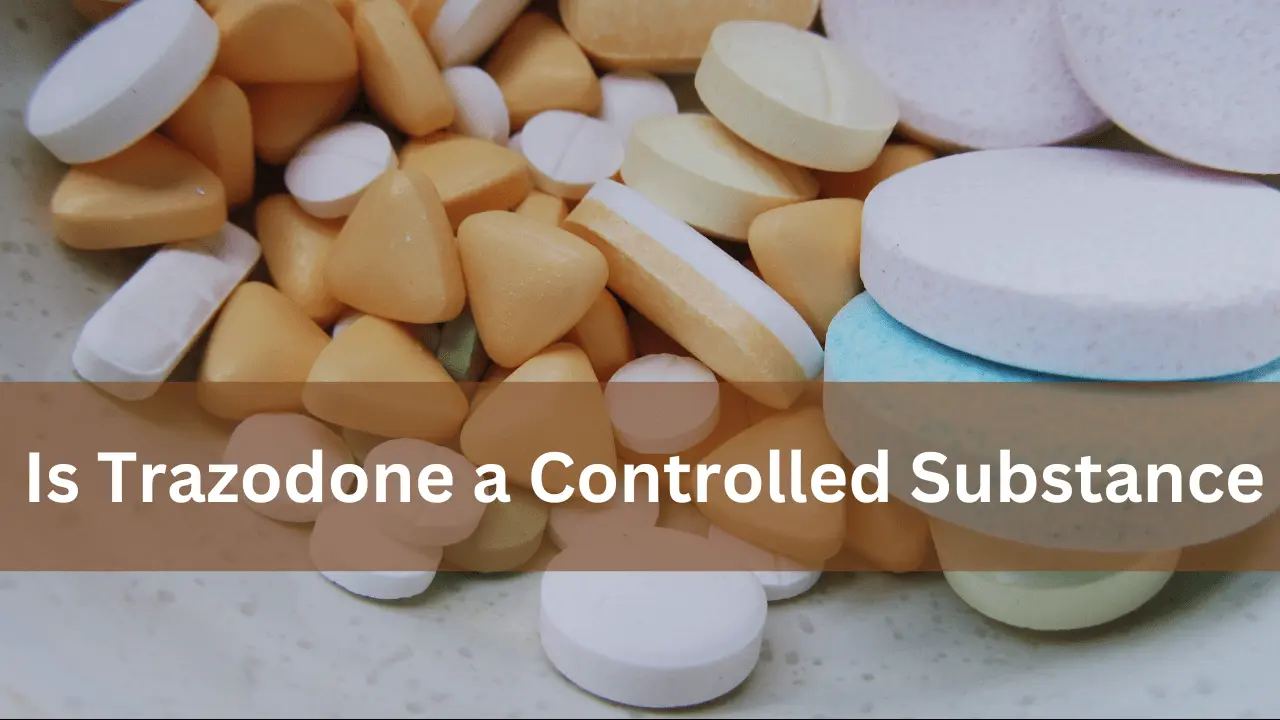Trazodone is a medication primarily used to treat certain mental health conditions, including depression and anxiety disorders. It belongs to a class of drugs known as serotonin modulators and works by affecting the levels of certain neurotransmitters in the brain. Here are some common uses and aspects of Trazodone:
- Depression: Trazodone is often prescribed to manage symptoms of depression. It can help improve mood, energy levels, appetite, and overall feelings of well-being.
- Anxiety Disorders: In some cases, Trazodone can be used to treat anxiety disorders, such as generalized anxiety disorder (GAD), social anxiety disorder, or panic disorder.
- Insomnia: Trazodone is sometimes prescribed off-label to treat insomnia, as it can have sedative effects that promote sleep. It’s especially helpful for individuals with depression-related insomnia.
- Off-Label Uses: Trazodone might be used off-label for conditions like post-traumatic stress disorder (PTSD), obsessive-compulsive disorder (OCD), or as an adjunct to other medications in certain cases.
- Sleep Aid: The sedative effects of Trazodone can make it suitable for people who have difficulty falling asleep or staying asleep. It’s often prescribed in lower doses for this purpose.
- Adjustment Disorder: Trazodone might be used in cases of adjustment disorder, which occurs when someone has difficulty coping with a significant life change or stressor.
Controlled Substances: Explained
Trazodone is not classified as a controlled substance in the United States. Controlled substances are drugs that are regulated by the government due to their potential for abuse, dependence, and misuse. These substances are categorized into different schedules based on their potential for harm and medical use.
Trazodone, being an antidepressant medication, does not have a high potential for abuse or addiction. It is generally considered safe when used as prescribed by a healthcare professional. Unlike controlled substances, Trazodone is typically not subject to strict regulations, such as limited prescription refills or specific prescribing requirements.
Trazodone’s Legal Classification
Trazodone is a prescription medication that is not classified as a controlled substance in most countries, including the United States. It is classified as a non-controlled prescription drug. This means that while it requires a prescription from a licensed healthcare professional, it is not subject to the same strict regulations and oversight as controlled substances, which have a higher potential for abuse and dependence.
Trazodone is typically prescribed to treat conditions such as depression, anxiety disorders, and insomnia. Its legal classification allows healthcare providers to prescribe it to patients based on their individual medical needs. It’s important to follow the prescribed dosage and usage instructions provided by the healthcare professional to ensure safe and effective use of the medication.
As legal classifications may vary by country and jurisdiction, it’s recommended to consult with a healthcare provider or pharmacist in your specific region for the most accurate and up-to-date information regarding the legal status of Trazodone.
Dispelling Misconceptions
Certainly, let’s address some common misconceptions about Trazodone:
- Trazodone is Only an Antidepressant: While Trazodone is primarily used as an antidepressant, it’s also prescribed for other conditions, such as anxiety disorders and insomnia.
- Trazodone is Highly Addictive: Trazodone is not considered highly addictive. It has a lower potential for abuse and dependence compared to some other medications.
- Trazodone Works Instantly: Trazodone typically takes time to show its full effects. It may take a few weeks for individuals to experience the full benefits of the medication.
- Trazodone is Unsafe for Elderly: Trazodone can be prescribed to elderly individuals for various conditions. However, lower doses may be recommended due to potential sensitivity.
- Trazodone is Only for Depression: While Trazodone is commonly used for depression, it can also be prescribed for anxiety disorders and as a sleep aid.
- Trazodone Interferes with All Medications: Trazodone can interact with certain medications, but not all. It’s important to discuss your full medication list with your healthcare provider.
- Trazodone Causes Weight Gain: Weight gain is not a universal side effect of Trazodone. Individual responses can vary, and not everyone experiences weight changes.
- Trazodone Should Be Stopped Abruptly: Abruptly stopping Trazodone can lead to withdrawal symptoms and potential health risks. It should be discontinued under medical supervision.
- Trazodone is Always Used as a Sleep Aid: While Trazodone can be prescribed for sleep, it has broader applications, including treating depression and anxiety.
- Trazodone is Ineffective: Trazodone can be effective for many individuals when used as prescribed and under medical guidance. Its efficacy varies from person to person.
Regulations and Prescription Requirements
Here are some key points regarding the regulations and prescription requirements for Trazodone:
- Prescription Medication: Trazodone is available only with a prescription from a licensed healthcare professional, such as a doctor, psychiatrist, or nurse practitioner.
- Medical Evaluation: Before prescribing Trazodone, a healthcare provider will assess your medical history, current health status, and any potential interactions with other medications you may be taking.
- Dosage and Usage Instructions: Trazodone should be taken exactly as prescribed by your healthcare provider. The dosage and duration of treatment will be determined based on your individual needs.
- Controlled Substance Classification: Trazodone is not classified as a controlled substance in most countries. However, its distribution and use are still regulated to ensure proper medical oversight.
- Patient Monitoring: Healthcare providers may monitor your progress while taking Trazodone to ensure that it is effectively addressing your symptoms and to manage any potential side effects.
- Refill Regulations: The regulations regarding refills of Trazodone prescriptions may vary. Some regions have restrictions on the number of refills, while others may require a new prescription for each refill.
- Potential Interactions: Inform your healthcare provider about all medications, supplements, and health conditions you have before starting Trazodone, as it may interact with other substances.
- Withdrawal and Discontinuation: If you and your healthcare provider decide to discontinue Trazodone, it’s important to follow their guidance. Stopping abruptly can lead to withdrawal symptoms.
- Age and Population Considerations: Trazodone dosage may vary based on factors like age, health status, and potential interactions. Children, adolescents, and elderly individuals may require different dosages.
- Adherence to Medical Advice: Always adhere to your healthcare provider’s advice regarding Trazodone usage. If you have any concerns or questions, discuss them with your healthcare provider.
Trazodone’s Potential for Misuse
Trazodone is generally considered to have a lower potential for misuse and abuse compared to some other medications. It is not classified as a controlled substance in most countries. However, like any medication, there are still considerations regarding its potential for misuse:
- Off-Label Use: Trazodone can be prescribed off-label for conditions such as insomnia and anxiety. While this is a legitimate medical practice, using it for non-medical purposes or without a prescription can be considered misuse.
- Sedative Effects: Trazodone has sedative properties that can induce drowsiness and sleepiness. Some individuals may misuse it to achieve these effects without a legitimate medical need.
- Combining with Other Substances: Misusing Trazodone by combining it with alcohol, other medications, or substances can lead to dangerous interactions and adverse effects.
- Dependency and Tolerance: Misuse of Trazodone can potentially lead to the development of tolerance and dependence, where the body becomes reliant on the medication for sleep or mood regulation.
- Overdose Risk: Misusing Trazodone by taking more than the prescribed dose can increase the risk of overdose, which can have serious health consequences.
The Importance of Medical Guidance
- Accurate Diagnosis: Healthcare professionals can accurately diagnose your condition and determine whether Trazodone is an appropriate treatment option based on your specific symptoms and medical history.
- Personalized Treatment Plan: A healthcare provider will create a personalized treatment plan that considers your individual needs, medical history, and any potential interactions with other medications or health conditions.
- Proper Dosage and Usage: Healthcare professionals determine the correct dosage and usage instructions for Trazodone based on factors like your age, weight, and the severity of your condition. Taking the correct dose is vital for safety and effectiveness.
- Monitoring and Adjustments: Medical professionals can monitor your progress while taking Trazodone and make any necessary adjustments to your treatment plan to ensure that the medication is working optimally and without causing adverse effects.
- Risk Assessment: Healthcare providers can assess potential risks associated with Trazodone, including interactions with other medications, side effects, and any contraindications based on your health profile.
- Addressing Concerns: If you have concerns about taking Trazodone, a healthcare professional can address these concerns and provide you with accurate information to make an informed decision.
- Avoiding Misuse and Overuse: Misusing or overusing Trazodone can lead to serious health consequences. A healthcare provider can guide you on the proper use of the medication to avoid such risks.
- Withdrawal and Discontinuation: If you and your healthcare provider decide to discontinue Trazodone, they can provide a proper plan to gradually taper off the medication, reducing the risk of withdrawal symptoms.
- Health Monitoring: If you have any pre-existing health conditions or take other medications, a healthcare provider can monitor how Trazodone interacts with your overall health to prevent complications.
- Well-Informed Decisions: Seeking medical guidance empowers you to make well-informed decisions about your health, ensuring that you’re receiving safe and effective treatment.
Conversations with Healthcare Providers
Here are some important topics to discuss during your conversations:
- Medical History: Provide your healthcare provider with a comprehensive medical history, including any pre-existing conditions, allergies, and current medications or supplements.
- Symptoms and Concerns: Clearly describe the symptoms or concerns you’re experiencing that led you to consider Trazodone. This information helps your provider understand your needs.
- Current Medications: Inform your healthcare provider about all medications, including over-the-counter drugs, supplements, and herbal remedies. Trazodone could interact with other substances.
- Previous Treatments: Discuss any previous treatments you’ve tried for your condition and their outcomes. This gives your provider insight into your treatment history.
- Benefits and Risks: Have a thorough discussion about the potential benefits of Trazodone for your condition and any possible side effects or risks associated with its use.
- Treatment Plan: Work with your provider to develop a treatment plan that outlines how Trazodone will be incorporated into your routine, including dosage, frequency, and duration.
- Side Effects and Management: Understand the potential side effects of Trazodone and how to manage them. Your provider can help you navigate any adverse effects that may arise.
- Monitoring and Adjustments: Discuss how your progress will be monitored and when you should follow up with your healthcare provider to assess the medication’s effectiveness.
- Questions and Concerns: Ask any questions or address any concerns you have about Trazodone. Your provider is there to provide accurate information and support your decisions.
- Long-Term Plans: If Trazodone is part of a long-term treatment plan, discuss how your provider envisions its role in your overall health and well-being.
Conclusion
In conclusion, understanding whether Trazodone is a controlled substance is crucial for those considering its use. By comprehending its legal classification, potential benefits, and associated risks, individuals can approach their healthcare decisions with confidence and informed choices. Remember, seeking guidance from healthcare professionals is paramount to ensure safe and effective use of medications like Trazodone.
Frequently Asked Questions
Q1: Is trazodone addictive?
Ans: No, trazodone is not considered addictive.
Q2: Can trazodone cause weight gain?
Ans: Yes, weight gain is a possible side effect of trazodone.
Q3. How long does it take for trazodone to work?
Ans: It can take several weeks for trazodone to work.
Q4. Can trazodone be used for anxiety?
Ans: Yes, trazodone can be used to treat anxiety.
Q5. Can trazodone be taken during pregnancy?
Ans: It is not recommended to take trazodone during pregnancy without consulting a healthcare professional.
Q6: What is trazodone used for?
Ans: Trazodone is used to treat depression, anxiety, and insomnia.




